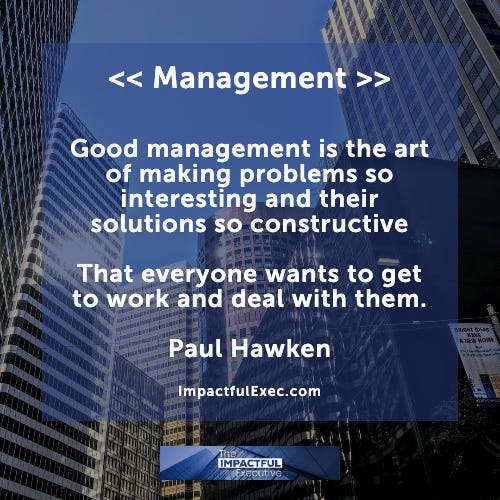Weekly Impact Brief (2023.Oct.01)
Organizations of the Future; Unconditional Culture; Moral Leadership; Spontaneous Speaking; Creativity and Technology; and Using Learning Brain Hacks.
Note: We are in private beta. There are rough edges; this Brief will evolve in the coming weeks before we launch more broadly. We value your feedback! To share your input, click here.
Read time: 3 min
Welcome
It’s great to have you here!
This Brief offers leaders quick, fact-driven insights on trending articles released in the last week around leadership, innovation, and more. These are curated from top sources, such as McKinsey, Harvard, and many others, looking at elements of the Impactful Framework.
In case you missed the last Impact Briefs, here are the links for the previous two: Sep 24th and Sep 17th.
Thought Starter
Last week, we covered the element of “Processes”; this week, we cover “Management”, a multifaceted function encompassing goal setting and planning, creating clear organizational structures, resource allocation, rewards and consequences, quick decision-making, ethical conduct, and crisis management.
Highlights
McKinsey & Company: The Organization Of The Future: Enabled By Gen AI, Driven By People
MIT Sloan Management Review: Make Culture Unconditional
Harvard Business Review: What It Means to Be a Moral Leader
Stanford Graduate School of Business: Think Faster, Talk Smarter: How to Speak Successfully When You're Put on the Spot
[Feature] Accenture: Brain Hacks To Facilitate Learning - Part 2
Impact Pulse
Each week, we review 200+ articles from 50+ premier academic and consulting firm sources to highlight a few “essentials” below.
The Organization Of The Future: Enabled By Gen AI, Driven By People
Big Idea: Generative AI, which should enable the automation of up to 70% of business activities by 2030, presents transformative business opportunities, but demands strategic and ethical integration to optimize workforce and organizational readiness to drive competitive advantage.
Quick Quote: “Our decades-long experience with digital transformations suggests that discussions about value creation must remain at the center. Work processes should enable short, quick cycles of experimentation and iteration and high-quality feedback loops among employees, leaders, and the gen AI applications themselves."
Make Culture Unconditional
Big Idea: An authentic "big 'C'" culture is differentiating, clear, credible, and consistent; however, many teams form varying "little 'c'" sub-cultures. Organizations need to ensure a genuine, overarching culture that employees can rely on.
Quick Quote: “Recent academic research has found no positive correlation between the cultural values a company emphasizes externally and employees’ belief that the company actually embodies those values… I’ve found that in order for a culture to be unconditional, it must be specific to the organization, clear, credible, and consistent while still leaving space for teams to have their own ways of working.”
What It Means to Be a Moral Leader
Big Idea: Moral leadership is essential to inspire qualities like trust, empathy, and ethics, particularly in discussions about AI and leadership. “Heart-centred” qualities are more important than skills to guide meaningful and responsible decision-making. Companies are confronted with societal issues, so neutrality is no longer an option.
Quick Quote: “Moral leadership is not about moralizing… Leadership is not about insisting upon certain behaviors; it’s about inspiring them… You can’t use carrots and sticks to elicit behaviors like trust, empathy, vulnerability, and courage… The hallmark of moral leadership is the pause. The faster the world gets and the more that comes at us, the more we need to pause."
Think Faster, Talk Smarter: How to Speak Successfully When You're Put on the Spot
Big Idea: Spontaneous speaking is the ability to respond confidently and effectively. Follow a six-step methodology focusing on mindset and messaging, emphasizing connection over perfection, viewing challenges as opportunities, reframing mistakes as “missed takes”, and providing practical structures and tips for different scenarios.
Quick Quote: “When we strive to be great… it actually prevents us from doing it well at all… When you're speaking and you're monitoring everything you're saying, and judging and evaluating it as you're saying it or even before you're saying it. You're not as effective… Maximize mediocrity so you can achieve greatness. When we focus on connecting with our audience, delivering a message that's relevant for them, we can actually do it better if we're not judging and evaluating. So that's the first mindset shift, connection over perfection.”
Featured Summary
Below are our featured insights for the week; a series of Accenture videos highlighting 10 brain hacks to facilitate learning.
Brain Hacks To Facilitate Learning - Part 2
Employ Brain Hacks to enhance learning.
For example: "Research indicates that when you spend time thinking about what you're learning or reflecting on it, it can increase your ability to retain that new knowledge by as much as 25 percent."
Lighter Side
As usual, let's end on a light note!
Here’s today’s cartoon.
Have a clever caption for today's cartoon?
Share it with us, and we might feature it on LinkedIn, Twitter, or in an upcoming Brief!
Parting Thoughts
Thank you for spending your precious time with us.
We are still in early “beta” mode for the coming weeks. If you find this Brief useful, please forward it now to share it far and wide!
Please feel free to reach out with any thoughts or questions that today’s insights might have sparked.
Impactfully yours,
Ali Monadjem (LinkedIn profile)
For The Impactful Executive Team
P.S. If you want to sign up for The Impactful Executive private email list or share it with a friend or colleague, you can find us here.










